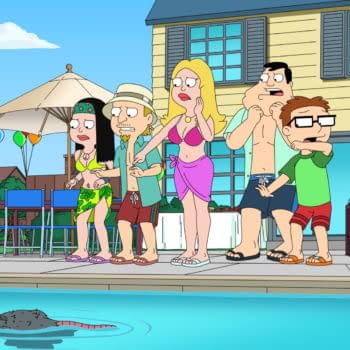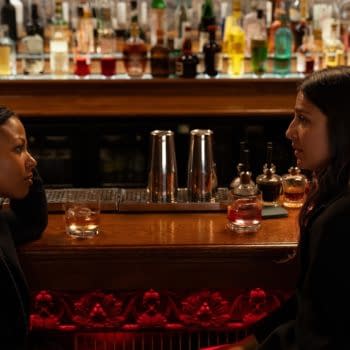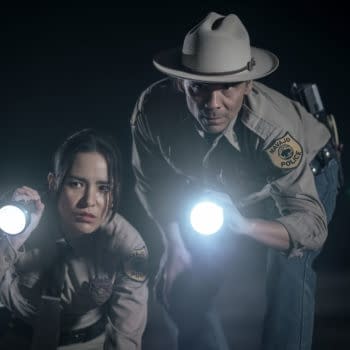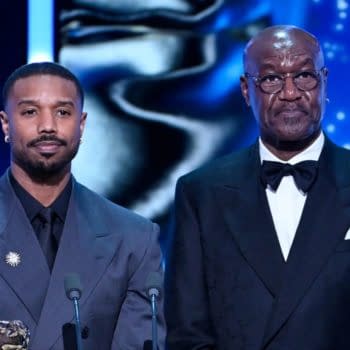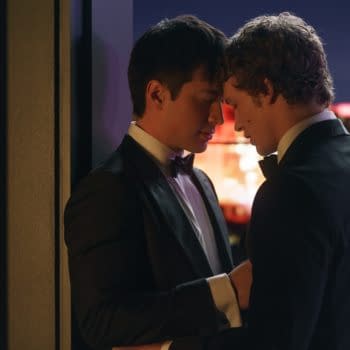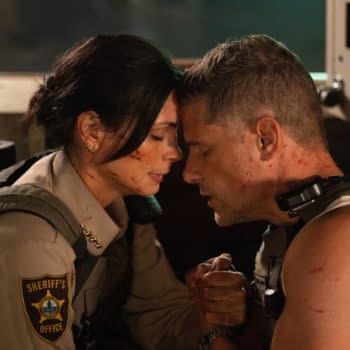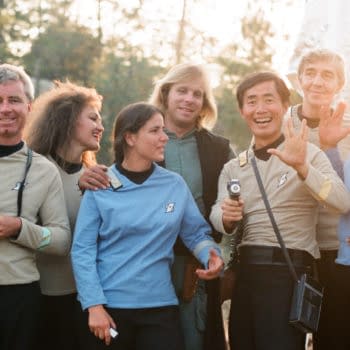Posted in: FX, Opinion, streaming, TV, TV, YouTube | Tagged: ahs, ahs 1984, ahs: nyc, American Horror Story, apocalypse, coven, freak show, fx, opinion
American Horror Story: We Rank 10 AHS Seasons So You Don't Have To
By the time you're reading this, most of you will have experienced the first two episodes of Ryan Murphy and Brad Falchuk's American Horror Story Season 11 (AHS: NYC). While we all take a few days to process it all, we thought the occasion of the long-running anthology's return would be the perfect excuse to share our revised rankings of its (now) previous ten seasons. But before we jump into the festivities, let me throw out a "preemptive strike" at those of you out there sharpening up your knives, getting ready for the attack. There are no "bad" seasons of Murphy & Falchuk's AHS, at least not after ten seasons. So consider this more of a countdown from "least favorite" to "favorite," with the understanding that even the seasons I didn't connect with are still "beautiful disasters" in my eyes. Why? Because this show is all about creative risk-taking and the desire to bring something fresh & original to all of our senses.
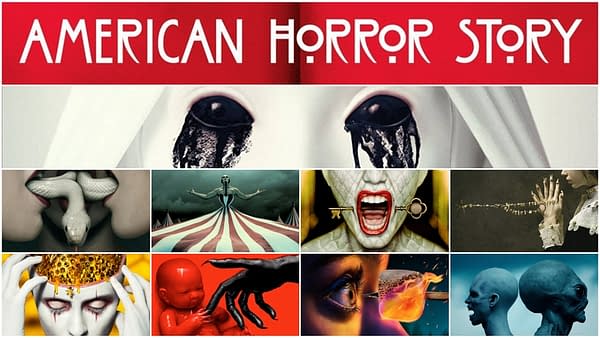
American Horror Story: BCTV's Definitive 10-Season Ranking
So here's a rundown of how I rank all ten seasons, along with additional thoughts & observations along the way. In addition, I've added some aspects from American Horror Stories that impacted and/or connected with the original franchise series (but please feel free to share any "connective tissue" that I may have missed or theories you might have in the comments below. But just to be clear? We consider this to be a pretty definitive ranking, so we're expecting nothing but love & praise for our genius. So in advance of that? You're welcome…
(10) "AHS: Double Feature: 'Red Tide'/'Death Valley'": Okay, a couple of things to get out of the way. First, if you're Sarah Paulson and you've just come off of a season where you're playing both the tragically heartbreaking Tuberculosis Karen in "Red Tide" and the coldly manipulative First Lady Mamie Eisenhower, you've more than earned the right to take a season or two off without having to explain yourself to anyone. Second, I'm not a big fan of beating up on a series that did the best that it could with a COVID-related bad situation. That said, I'm not sure "Double Feature" will be leaving the basement anytime soon. "Red Tide" should've been the focus; instead, cut short by the disappointing "Death Valley." I appreciated the sharp attack on both sides of the creative process that the first chapter brought, with Evan Peters (Austin Sommers) & Frances Conroy (Sarah Cunningham / Belle Noir) making an impressive pairing, as did Paulson & Macaulay Culkin (Mickey). This was a mini-universe within AHS that I wish we would've spent more time in. That wasn't the case with "Death Valley," which felt like a rambling scripted snuff film with very little payoff. That said, performances from Lily Rabe (Amelia Earhart), Leslie Grossman (Calico), Neal McDonough (Dwight D. Eisenhower), and others helped save the arc from itself.
(9) "AHS: Hotel": When it comes to a season working or not working for me, it usually boils down to how well I can connect with it (as I mentioned earlier). The biggest reason I had issues connecting? Lady Gaga's The Countess / Elizabeth Johnson- and I am doubly shocked because there isn't much from her musically or otherwise that I'm not a fan of. But her performance reminded me of Natalie Portman in the "Star Wars" prequels: an excellent actor who seems to be just marching through the role, and I can't shake this feeling that it was an agreed-upon approach to the character. Whatever the reason, it ripple-effected its way through the other storylines. It felt like a stew of various season ideas with the hotel device to link them, but it wasn't enough. That said, props to Denis O'Hare as Liz Taylor, Sarah Paulson as Sally McKenna and Billie Dean Howard (needs a spinoff), and the devastatingly powerful "Devil's Night."
(8) "AHS: Asylum": Okay, is there anyone out there who can look me in the eye and tell me there wasn't too much going on this season? Known as "The Season That Started the Alien Debate," this season couldn't decide what genre it wanted to be, and by the time it did? Too few episodes left to clean up so many things that had been built up. That said, props to Zachary Quinto as Dr. Oliver Thredson and Paulson as Lana Winters- both for their individual performances as well as their shared screen time. Lily Rabe's Sister Mary Eunice McKee cemented her in the upper echelons of the "Murphy-verse," and props to the season for promoting Adam Levine and then killing him off in record time: bold move for a still-relatively young series getting its footing. The most satisfying moment came when Winters reconciled with her murderous son Johnny (Dylan McDermott)- just in time to kill him herself. First, because it was the closure Winters deserved, but most of all? It kept McDermott in the "Murphy-verse."
(7) "AHS: Freak Show": This is the season that reminds me of Stanley Kubrick's Full Metal Jacket in one way: a classic beginning that loses its way by staying around a little too long. For me, "Edward Mordrake (Part 2)" felt like it was the end of the season- I was legitimately surprised that there were still nine more episodes to go (thankfully, AHS has found the sweet spot when it comes to the right amount of episodes). Wes Bentley's Edward Mordrake wasn't a concept or character that I hated (mostly because of Bentley and his ability to pull off questionable facial hair), but it also wasn't something I felt invested in. But then you have Sarah Paulson's amazing ability to instill individuality and personality in Bette and Dot Tattler, and that helps cover a ton of mistakes. Michael Chiklis's Dell Toledo was an impressive break from Chiklis's previous run of roles, impressively playing against type as much as O'Hare did as Stanley. Finn Wittrock's Dandy Mott made us want to reach through the screen and strangle him (in a good way), and then there's Jessica Lange's Elsa Mars and John Carroll Lynch's Twisty the Clown: two distinctly different yet impactful acting powerhouses.
(6) "AHS: Murder House": The one that started it all, so it's also the one that carried the most responsibility. Is it perfect? No. In fact, Lange was given way too much dialogue to have to execute to clean up all the question marks that remained before the series wrapped. But that's small potatoes compared to the narrative seeds that were planted that are still taking route nine seasons later. But just take a second and think back to this line-up: Connie Britton (who I wish we got to see more of in American Horror Story), McDermott, Evan Peters, Taissa Farmiga, O'Hare, and Lange. Those are five actors who have or could front their own series (and you can never go wrong with more of Paulson's Billie Dean Howard. Much like "Star Wars" fans consider "A New Hope" sacred, that's my vibe with "Murder House." That said, I've found myself becoming more protective of it over the years, especially after the confusion left in the wake of American Horror Stories.
(5) "AHS: Roanoke": I'm still not sure exactly how many different characters each person was playing during the season, and I needed a Charlie/It's Always Sunny in Philadelphia conspiracy board to keep everything straight between what was "real" and what was the show-within-a-show. Normally, that would bother the Hell out of me, but because "Roanoke" did a strong job expanding the AHS universe's overarching mythology. Think of it as what happens when you mash up "found footage" with Inception, and sprinkle in a nice coating of "meta." While Kathy Bates deservedly received credit for some amazing turns in several seasons, her run as Thomasin White, aka The Butcher (as well as Agnes Mary Winstead) deserves more attention. This was also the season that Cheyenne Jackson landed on our radar as Sidney Aaron James, in an excellent turn that foreshadowed his run in "Apocalypse."
(4) "AHS: Cult": How do you decide between Paulson demonstrating to viewers the various facets of Ally Mayfair-Richards's season-long evolution and Peters getting to the essence of six (in)famous cult leaders (Andy Warhol, Marshall Applewhite, David Koresh, Jim Jones, Jesus, and Charles Manson)? You don't. You just appreciate both of them. But while you're at it, you also add Adina Porter's Beverly Hope to that list of impressive performances, as well as Billie Lourd, Leslie Grossman, and Chaz Bono. But this season came down to the make-or-break back-n-forths between Peters and Paulson- and once again, they did not disappoint. The season gets extra points for one of the most disturbing killings we've seen from the franchise: Emma Roberts's reporter Serena Belinda being killed by one of Kai's (Peters) clowns- and we literally see it coming but can do nothing about it.
(3) "AHS: Coven": A season about a modern coven of witches that must deal with threats from outside and from within? And you're giving me Paulson, Rabe, Roberts, Lange, Taissa Farmiga, Frances Conroy, Angela Bassett (Amen!), Gabourey Sidibe, and a ton of others? Yes, please. For me, "Coven" is the only season that is deserving of its own spinoff season- and the one that felt like the passing of the American Horror Story crown from Lange to Paulson. You'll never lose points with me for having Stevie Nicks as "The White Witch," but what wins me over about this season was its sense of family- even the ugly, heartbreaking parts of it. And serious bonus points go to American Horror Stories S02E01 "Dollhouse" for offering us more of Spalding's (O'Hare) backstory on how he found his way to Myrtle (Conroy) and the Coven.
(2) "AHS: Apocalypse": I know some of you might be scoffing. But for me, this was The Love Boat landing on Fantasy Island. The was a horror version of "Crisis on Infinite Earths." This was the season that played upon every single "feel" my inner geek had since it was a little to have all of his action figures exist in a shared universe. And you do it by bringing in the heavy hitters from "Coven" to serve as our "Justice League"? How can you possibly go wrong? You can't, especially when you have career-strengthening turns by Lourd as our new supreme Mallory and Grossman's Coco St. Pierre Vanderbilt- who she portrayed so distinctly different between the "before" and "after" moments that we credit her with two roles this season. But it was Cody Fern's Anti-Christ Michael Langdon who stole the show… and nearly destroyed the world in the process. From moments of sympathy to moments of pure, unadulterated hatred, Fern had viewers running a gamut of emotions- and the viewers and the series were better for it. What keeps it from the top spot? Without another Charlie/It's Always Sunny in Philadelphia conspiracy board, I'm still not sure what changes happened in "Return to Murder House" actually stuck by the end of the season finale (because there's some heartbreak returning if they didn't).
(1) "AHS: 1984": The perfect season for reasons too numerous to go into in this rundown, but let's look at a few. First, it was the season that proved "the kids are alright"- without either Paulson or Peters aboard to serve as experienced "anchors" for the ensemble. That might be one of the reasons why the season worked so well: it felt like a true collective as opposed to one or two "mains" with impressive support. Whether it was Roberts, Lourd, Grossman, or Fern, the veteran cast couldn't have looked like they were having any more fun than if they pointed at the camera and told us themselves- and it translated into how serious they took their roles even during the more absurd moments. I hope to see more of Matthew Morrison, Zach Villa, and Gus Kenworthy in future seasons (and props to Gus, who wasn't impressive in his first ep but really flipped things 180 degrees in no time), and Angelica Ross should be given the keys to the seasons for whatever she wants to do.
But it was the foundational theme of the family during this season that worked for me. To be a better man and a better father for his son Bobby (Whitrock) and to break the cycle of violence, we see Lynch's Benjamin Richter, aka Mr. Jingles, as one of Murphy and Falchuk's most tragically heroic figures. For me, being able to say that a season proved Grossman could play a beautifully despisable (in a good way) "big bad" found a way to connect the entire franchise in a way that raised as many questions as it answered, offered us what can best be described as a "happy ending" while staying true to franchise's foundations, and a dozen other accolades mean the top spot is well-deserved. Plus, doesn't it make you sleep a little better at night knowing that Camp Redwood's protectors are on the job?




